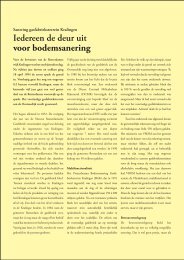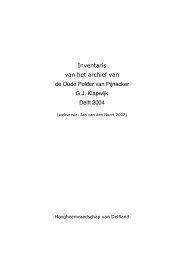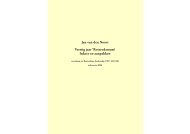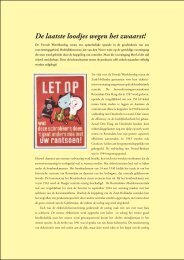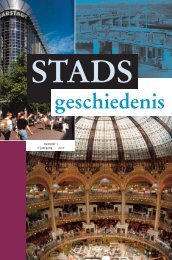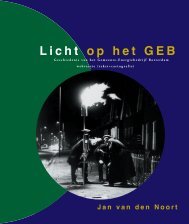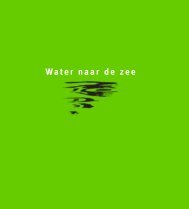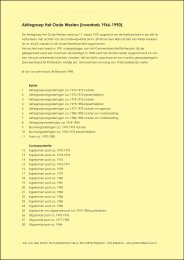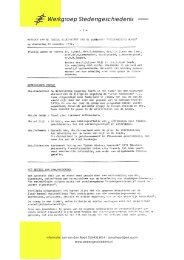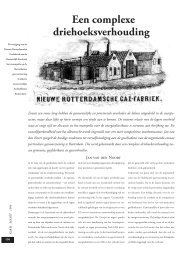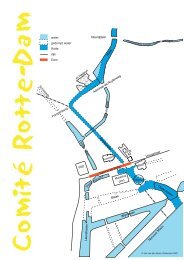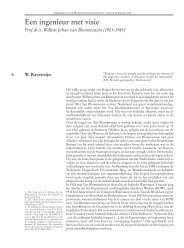Net Werk voor de Geschiedenis van Hygiene en Milieu, 1999-2001 ...
Net Werk voor de Geschiedenis van Hygiene en Milieu, 1999-2001 ...
Net Werk voor de Geschiedenis van Hygiene en Milieu, 1999-2001 ...
You also want an ePaper? Increase the reach of your titles
YUMPU automatically turns print PDFs into web optimized ePapers that Google loves.
Topics of Discussion in the Sessions<br />
Resources<br />
What were / what are resources<br />
(material and immaterial in the<br />
course of evolution<br />
Man - <strong>en</strong>vironm<strong>en</strong>t relations /The<br />
g<strong>en</strong>esis of exploitation<br />
Effects of people on <strong>en</strong>vironm<strong>en</strong>ts /<br />
Effects of <strong>en</strong>vironm<strong>en</strong>ts on people<br />
Sustainance and exploitation<br />
Exploitation and over-exploitation<br />
of what<br />
Economy versus ecology: An unavoidable<br />
conflict<br />
Reproduction<br />
Human needs<br />
Ecology, diet and social patterning<br />
Health and exploitation / over-exploitation<br />
G<strong>en</strong><strong>de</strong>r relations in productive behaviour<br />
Is there g<strong>en</strong><strong>de</strong>r exploitation in reproductive<br />
behaviour<br />
G<strong>en</strong>etic, <strong>en</strong>vironm<strong>en</strong>tal and sociocultural<br />
backgrounds to the stability<br />
or growth of populations<br />
Sustainability<br />
Is “sustainability” a new concept in<br />
<strong>de</strong>velopm<strong>en</strong>t planning<br />
Resource-managem<strong>en</strong>t and sustainability<br />
Phases in life, g<strong>en</strong>eration-sets, posterity:<br />
diverging concepts<br />
Population pressure and sustainability<br />
Sustainability in which geographical<br />
and social dim<strong>en</strong>sions<br />
lnnovation<br />
Transformation processes in pre-industrial<br />
and industrial societies /<br />
Technical innovations /<br />
Paradigms of sci<strong>en</strong>tific and/or ethical<br />
innovations<br />
Factors for innovations / How to<br />
stop or reduce over-exploitation~<br />
Preservation of elem<strong>en</strong>ts of former<br />
culture / cultural tradition:<br />
Hindrance of innovation<br />
Nature in Culture /<br />
Culture in Nature<br />
Territoriality, power and control of<br />
resources<br />
Exploitation and over-exploitation<br />
in the animal domain<br />
Affective and emotional response<br />
in man with regard to changes in<br />
nature and innovations: The nature<br />
of the human brain<br />
Exploitation of nature associated<br />
with religious belief or ethic co<strong>de</strong>:<br />
Diverging views<br />
Global Thinking<br />
Inv<strong>en</strong>tion or diffusion / Inv<strong>en</strong>tion<br />
and diffusion<br />
Processes in the “Communication<br />
age”<br />
Local knowledge and global exploitation<br />
and expropriation still<br />
valid as an explanation for “un<strong>de</strong>r<strong>de</strong>velopm<strong>en</strong>t”<br />
International Confer<strong>en</strong>ces: Awar<strong>en</strong>ess,<br />
warning:<br />
What about political facts of <strong>en</strong>forcem<strong>en</strong>t<br />
25<br />
26<br />
68<br />
contactblad <strong>van</strong> <strong>de</strong><br />
stichting net werk <strong>voor</strong> <strong>de</strong><br />
1084-1085<br />
geschie<strong>de</strong>nis <strong>van</strong> hygiëne <strong>en</strong> milieu<br />
redactie: myriam d a r u<br />
webversie: jan <strong>van</strong> <strong>de</strong>n n o o r t<br />
Confer<strong>en</strong>ce Fee<br />
Congress fee 160.00 $ (200 US$<br />
after March 31st. <strong>2001</strong>)<br />
Stu<strong>de</strong>nt fee 80.00 $ (100 US$ after<br />
March 31st. <strong>2001</strong>)<br />
Partner Programmes will be offered.<br />
IWF<br />
Nonn<strong>en</strong>stieg 72,<br />
D-37075 Götting<strong>en</strong>, Duitsland<br />
Tel: +49/551 /5024- 170<br />
Fax: +49/551 /5024-403<br />
E-mail: iwf.secr.-gsw@iwf.<strong>de</strong><br />
www.iwf.<strong>de</strong>/iuaes-goetting<strong>en</strong>-<strong>2001</strong><br />
The International Water<br />
History Association (IWHA)<br />
2nd confer<strong>en</strong>ce 10th -12th August<br />
<strong>2001</strong> University of Berg<strong>en</strong>, Norway<br />
(reeds in nummer 67 aangekondigd)<br />
The International Water History<br />
Association (IWHA) 2nd confer<strong>en</strong>ce<br />
will bring together researchers<br />
from differ<strong>en</strong>t disciplines who all<br />
study the character and role of<br />
freshwater in history and <strong>de</strong>velopm<strong>en</strong>t.<br />
It is organised in co-operation<br />
with UNESCO’s International<br />
Hydrological Programme.<br />
While freshwater is a true universal<br />
and no human being and no society<br />
can exist without it, its natural<br />
characteristics vary extremely from<br />
place to place and from time to<br />
time. Societies have managed and<br />
harnessed water in various ways<br />
with various implications both for<br />
water resources and for society. This<br />
confer<strong>en</strong>ce will explore these variations<br />
in man/water relations in time<br />
and space, and examine why some<br />
societies have appar<strong>en</strong>tly succee<strong>de</strong>d,<br />
while others have failed to secure a<br />
sound managem<strong>en</strong>t system of their<br />
fresh water.<br />
The confer<strong>en</strong>ce will have three main<br />
aims:<br />
- to pres<strong>en</strong>t differ<strong>en</strong>t empirical<br />
research findings and to create a<br />
forum for theoretical discussions<br />
on how the relationship betwe<strong>en</strong><br />
man and water can be analysed<br />
and un<strong>de</strong>rstood in the most fruitful<br />
ways.<br />
- to produce rele<strong>van</strong>t input into<br />
pres<strong>en</strong>t day <strong>de</strong>bates about issues<br />
including the control and ownership<br />
of water, water conflicts and<br />
water pollution.<br />
- to discuss cont<strong>en</strong>t and profile of<br />
a multi-volume World Water<br />
History planned by UNESCO<br />
in cooperation with IWHA. The<br />
confer<strong>en</strong>ce will offer opportunities<br />
for researchers to pres<strong>en</strong>t perspectives<br />
on water history useful<br />
for the book series.<br />
Provisional themes<br />
A The political economy of water<br />
ownership and control<br />
B Images of water (in religion,<br />
myths, literature and art)<br />
C History of hydrology and water<br />
control<br />
D Narratives on the river and the dam<br />
26<br />
27<br />
25/26<br />
<strong>Net</strong> <strong>Werk</strong> 68 - februari <strong>2001</strong><br />
26/27



